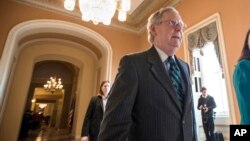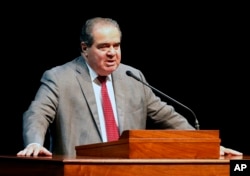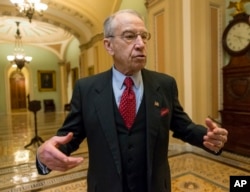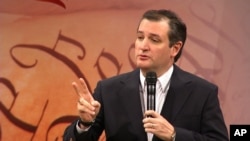The partisan fight over a U.S. Supreme Court vacancy burst onto the Senate floor Monday, as lawmakers disagreed sharply on whether President Barack Obama should nominate a replacement for Justice Antonin Scalia, who died nine days earlier.
The chairman of the Senate Judiciary Committee, Republican Chuck Grassley, argued that presidential election years are inappropriate for considering high court nominations.
“The campaign for our next commander-in-chief is in full swing. Voting has begun,” Grassley said. “And a term limited Democrat in the twilight of his presidency occupies the White House.”
“We’re seeing an unprecedented attempt to hold hostage an entire branch of government,” said Democratic Minority Leader Harry Reid. “This is a foolish gambit to deny President Obama his constitutional right to appoint nominees to the Supreme Court.”
Scalia tribute
The Senate observed a moment of silence for Scalia, and Majority Leader Mitch McConnell paid tribute to the late justice’s life and life’s work, calling him “larger than life.”
“Justice Scalia was an articulate champion of the Constitution; he was a personality unto himself. And his passing is a significant loss for the court and for our country,” McConnell said.
It was McConnell who helped launch the nomination brawl by issuing a statement within hours of Scalia’s death saying the next president, not Obama, should pick his replacement. On Monday, however, he stayed clear of the fray by limiting his floor remarks to lauding the arch conservative jurist.
No so for those who followed McConnell.
Grassley, whose committee is tasked with holding confirmation hearings for judicial nominees, said he takes guidance from a preceding chairman: Vice President Joe Biden, who as a senator wielded the gavel at the Judiciary Committee from 1987 to 1995.
Grassley noted that, in 1992, also an election year, Biden argued against then-Republican President George H.W. Bush filling any Supreme Court vacancies that might arise. Grassley quoted extensively from Biden’s speech delivered more than two decades ago.
“These are the Biden rules,” Grassley said. “The Biden rules recognize that ‘Once the political season is under way, action on a Supreme Court nomination must be put off until after the election campaign is over. That is what is fair to the nominee and is central to the process.’”
“This Senate must do what he [Biden] said it must do in 1992,” Grassley added.
“I find no mention of a three-year presidency in our Constitution,” countered Reid. “The Founding Fathers never intended the Senate to simply run out the clock on its constitutional duties, subverting the president’s authority and leaving the judiciary in absolute limbo.”
Vetting process
The White House says it is vetting potential Supreme Court picks, and that Obama is reaching out to senators to urge full consideration of the eventual nominee.
A few Republicans are backing the president’s call.
Senator Mark Kirk, who is up for reelection in Democratic leaning Illinois, wrote in an opinion piece for the Chicago Sun-Times newspaper: “I recognize the right of the president, be it Republican or Democrat, to place before the Senate a nominee for the Supreme Court.”
"I also recognize my duty as a senator to either vote in support or opposition to that nominee following a fair and thorough hearing,” Kirk added.
Confirmation hurdles
But consideration by no means guarantees confirmation. Republican Senator Ted Cruz, who is seeking his party’s presidential nomination, has pledged to block any Obama nominee to the high court.
Overcoming that procedural hurdle would require 14 Republicans to side with Democrats in order to get to a final up-or-down vote.
The outcome of the nomination battle could determine the Supreme Court’s ideological tilt for a generation or more. Until the vacancy is filled, the court will operate with eight justices: four regarded as liberals and four regarded as conservatives.







